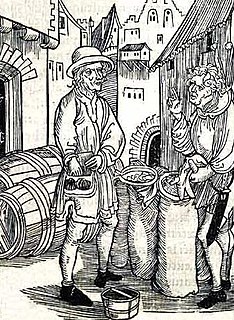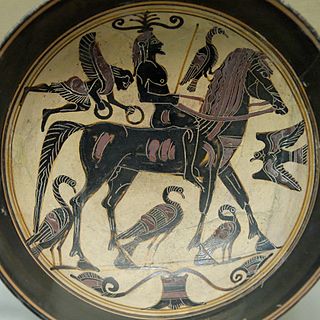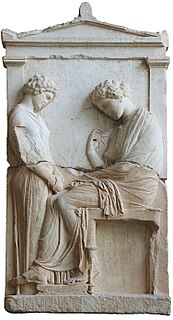Related Research Articles
The Gracchi brothers, Tiberius and Gaius, were Romans who both served as tribunes of the plebs between 133 and 121 BC. They attempted to redistribute the occupation of the ager publicus— the public land hitherto controlled principally by aristocrats—to the urban poor and veterans, in addition to other social and constitutional reforms. After achieving some early success, both were assassinated by the Optimates, the conservative faction in the senate that opposed these reforms.

Solon was an Athenian statesman, lawmaker and poet. He is remembered particularly for his efforts to legislate against political, economic and moral decline in archaic Athens. His reforms failed in the short term, yet he is often credited with having laid the foundations for Athenian democracy. He wrote poetry for pleasure, as patriotic propaganda, and in defence of his constitutional reform.

Ancient Greece was a northeastern Mediterranean civilization, existing from the Greek Dark Ages of the 12th–9th centuries BC to the end of classical antiquity, that comprised a loose collection of culturally and linguistically related city-states and other territories—unified only once, for 13 years, under Alexander the Great's empire. In Western history, the era of classical antiquity was immediately followed by the Early Middle Ages and the Byzantine period.

Debt bondage, also known as debt slavery, bonded labour, or peonage, is the pledge of a person's services as security for the repayment for a debt or other obligation, where the terms of the repayment are not clearly or reasonably stated, and the person who is holding the debt thus has some control over the laborer. Freedom is assumed on debt repayment. The services required to repay the debt may be undefined, and the services' duration may be undefined, thus allowing the person supposedly owed the debt to demand services indefinitely. Debt bondage can be passed on from generation to generation.
In ancient Greece, a metic was a foreign resident of Athens, one who did not have citizen rights in their Greek city-state (polis) of residence.

The Solonian Constitution was created by Solon in the early 6th century BC. At the time of Solon the Athenian State was almost falling to pieces in consequence of dissensions between the parties into which the population was divided. Solon wanted to revise or abolish the older laws of Draco. He promulgated a code of laws embracing the whole of public and private life, the salutary effects of which lasted long after the end of his constitution.
Fifth-century Athens is the Greek city-state of Athens in the time from 480 to 404 BC. Formerly known as the Golden Age of Athens, the later part being the Age of Pericles, it was buoyed by political hegemony, economic growth and cultural flourishing. The period began in 478 BC, after the defeat of the Persian invasion, when an Athenian-led coalition of city-states, known as the Delian League, confronted the Persians to keep the liberated Asian Greek cities free.

Usury is the practice of making unethical or immoral monetary loans that unfairly enrich the lender. The term may be used in a moral sense—condemning, taking advantage of others' misfortunes—or in a legal sense, where an interest rate is charged in excess of the maximum rate that is allowed by law. A loan may be considered usurious because of excessive or abusive interest rates or other factors defined by the laws of a state. Someone who practices usury can be called an usurer, but in modern colloquial English may be called a loan shark.

Cleisthenes or Clisthenes was an ancient Athenian lawgiver credited with reforming the constitution of ancient Athens and setting it on a democratic footing in 508 BC. For these accomplishments, historians refer to him as "the father of Athenian democracy." He was a member of the aristocratic Alcmaeonid clan. He was the younger son of Megacles and Agariste making him the maternal grandson of the tyrant Cleisthenes of Sicyon. He was also credited with increasing the power of the Athenian citizens' assembly and for reducing the power of the nobility over Athenian politics.
In cities of ancient Greece, the boule was a council of over 500 citizens appointed to run daily affairs of the city. Originally a council of nobles advising a king, boulai evolved according to the constitution of the city: In oligarchies boule positions might have been hereditary, while in democracies members were typically chosen by lot and served for one year. Little is known about the workings of many boulai, except in the case of Athens, for which extensive material has survived.

Archaic Greece was the period in Greek history lasting from circa 800 BC to the second Persian invasion of Greece in 480 BC, following the Greek Dark Ages and succeeded by the Classical period. In the archaic period, Greeks settled across the Mediterranean and the Black Seas, as far as Marseille in the west and Trapezus (Trebizond) in the east; and by the end of the archaic period, they were part of a trade network that spanned the entire Mediterranean.
Seisachtheia was a set of laws instituted by the Athenian lawmaker Solon in order to rectify the widespread serfdom and slavery that had run rampant in Athens by the 6th century BCE, by debt relief.
Ancient Greek law consists of the laws and legal institutions of Ancient Greece.
The law courts in ancient Athens were a fundamental organ of democratic governance. According to Aristotle, whoever controls the courts controls the state.

The economy of ancient Greece was defined largely by the region's dependence on imported goods. As a result of the poor quality of Greece's soil, agricultural trade was of particular importance. The impact of limited crop production was somewhat offset by Greece's paramount location, as its position in the Mediterranean gave its provinces control over some of Egypt's most crucial seaports and trade routes. Beginning in the 6th century BC, trade craftsmanship and commerce, principally maritime, became pivotal aspects of Greek economic output.

Hippeis is a Greek term for cavalry. In ancient Athenian society, after the political reforms of Solon, the hippeus was the second highest of the four social classes. It was composed of men who had at least 300 medimnoi or their equivalent as yearly income. According to the Timocratic Constitution the average citizen had a yearly income of less than 200 medimnoi. This gave the men who made 300 medimnoi the ability to purchase and maintain a war horse during their service to the state.

Peisistratos, Latinized as Pisistratus, was a ruler of ancient Athens during most of the period between 561 and 527 BC. His unification of Attica, the triangular peninsula of Greece containing Athens, along with economic and cultural improvements laid the groundwork for the later preeminence of Athens in ancient Greece. His legacy lies primarily in his institution of the Panathenaic Games, historically assigned the date of 566 BC, and the consequent first attempt at producing a definitive version of the Homeric epics. Peisistratos' championing of the lower class of Athens, the hyperakrioi, is an early example of populism. While in power, he did not hesitate to confront the aristocracy and greatly reduce their privileges, confiscating their lands and giving them to the poor. Peisistratos funded many religious and artistic programs, in order to improve the economy and spread the wealth more equally among the Athenian people.

Slavery was an accepted practice in ancient Greece, as in other societies of the time. Some Ancient Greek writers described slavery as natural and even necessary. This paradigm was notably questioned in Socratic dialogues; the Stoics produced the first recorded condemnation of slavery.

Athenian democracy developed around the 6th century BC in the Greek city-state of Athens, comprising the city of Athens and the surrounding territory of Attica. Although Athens is the most famous ancient Greek democratic city-state, it was not the only one, nor was it the first; multiple other city-states adopted similar democratic constitutions before Athens.

The Athenian Revolution was a revolt by the people of Athens that overthrew the ruling aristocratic oligarchy, establishing the almost century-long self-governance of Athens in the form of a participatory democracy – open to all free male citizens. It was a reaction to a broader trend of tyranny that had swept through Athens and the rest of Greece.
References
- ↑ Kagan, Ozment, Turner, & Frank, Donald, Steven, Frank M., & Alison (2013). The Western Heritage. United States: Pearson Education, Inc. p. 46. ISBN 9780205896226.CS1 maint: multiple names: authors list (link)